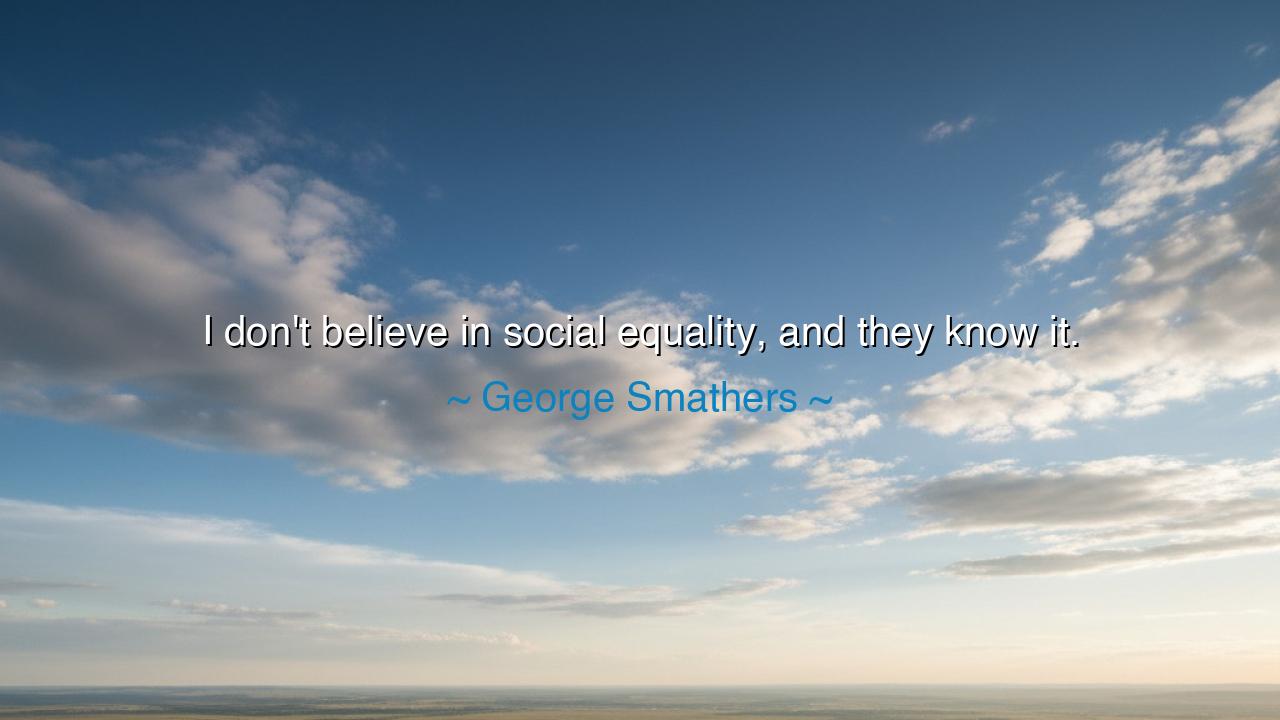
I don't believe in social equality, and they know it.






In the stark and unapologetic words of George Smathers, we hear the echo of an age divided by fear and pride: “I don’t believe in social equality, and they know it.” These are not the words of compassion, but of conviction—born from a time when men measured one another not by the content of their character, but by the color of their skin and the class of their birth. Yet in their bluntness lies a terrible clarity. For Smathers, a senator of the American South in the mid-twentieth century, was not hiding behind gentle words or veiled rhetoric. He spoke what many thought but dared not confess—that the idea of equality, so cherished in principle, was in his heart a threat to the order he knew. His statement is not merely a confession of belief; it is the voice of a world struggling between the dying past and the dawning future.
The origin of this quote lies in the political and moral storms of the American South during the 1950s and 1960s, a time when the question of social equality—between white and Black Americans—was forcing the conscience of a nation to awaken. Smathers, a senator from Florida and a contemporary of segregationists like Strom Thurmond and James Eastland, stood among those who resisted the growing tide of civil rights reform. He believed, as many of his era did, that nature and tradition ordained separation—that the mingling of races, the sharing of schools and spaces, would dissolve the fabric of society. His words, thus, are both historical and symbolic: a mirror reflecting the moral blindness of a generation that mistook privilege for order and inequality for peace.
Yet even as he spoke them, the world was changing. The air was alive with the voices of those who would not accept such a creed. Martin Luther King Jr. marched through the streets of Montgomery and Selma, armed not with violence but with truth—declaring that injustice anywhere was a threat to justice everywhere. Rosa Parks refused to yield her seat, and with that simple act, she tore open the curtain that concealed America’s hypocrisy. To them, and to countless others, equality was not a matter of social comfort, but of sacred destiny. Against the chill arrogance of Smathers’s words rose a new fire—one that said no man was born to serve another, that every soul bears the same light, the same right to dignity and respect.
Throughout history, this struggle has repeated itself in many forms. The Pharaohs of Egypt once declared that only the divine blood of kings could rule, while the slaves toiled in the dust below. Yet one day, Moses rose up from among them, speaking for the oppressed and declaring that freedom was not a gift of rulers, but the will of God. The story is the same across ages—the few clinging to privilege, the many rising in truth. Smathers’s words, though spoken in his time, belong to a pattern that has haunted humanity since the first hierarchies were born. They remind us that every age must face its own tyrannies—sometimes in the body, sometimes in the soul.
But let us not read his words with scorn alone. Let us read them with understanding, for even the darkness of ignorance teaches light. When Smathers said he did not believe in social equality, he was not speaking for himself alone—he was voicing the fear of millions who believed that to share power was to lose it, that to lift another up was to be pulled down. This fear, ancient and persistent, still whispers in the hearts of men and nations. It is the fear that equality will erase distinction, that justice will upend order. Yet the truth, as the wise have long known, is the opposite: only equality gives order its meaning, only justice gives peace its strength.
The lesson, then, is not merely to condemn such words, but to transcend them. For every generation must choose whether to cling to the privileges of the few or to embrace the dignity of all. To believe in social equality is not to deny difference—it is to honor the divine worth within each difference. The strong must lift the weak, the rich must guard the poor, the learned must teach the unlearned. This is not the weakness of the compassionate; it is the strength of the righteous. The ancients called it virtus—the virtue that makes a man not by his birth, but by his deeds.
So let these words of George Smathers stand not as an anthem, but as a warning. For every time a man declares that equality is not his belief, he condemns not others, but himself—to the smallness of a soul that fears the greatness of others. The world has seen many such men rise and fall, their empires crumbling as freedom marches on. And so it will always be. The wise will remember that history bends, slowly but surely, toward justice—not because of power, but because of truth.
Therefore, to the generations that follow: believe in equality, even when the world does not. For to believe in equality is to believe in humanity itself. Build bridges where others build walls; listen where others shout; uplift where others oppress. Let the words of the past remind you not of what to repeat, but of what to overcome. For when we reject the creed of inequality, we do not merely change laws—we renew the soul of mankind, and carry forward the eternal torch of freedom that no darkness, however proud, can ever extinguish.






AAdministratorAdministrator
Welcome, honored guests. Please leave a comment, we will respond soon